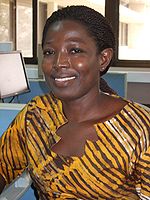Difference between revisions of "User:Helen Atipoka"
| Line 2: | Line 2: | ||
My name is Helen Atipoka Adongo, a lecturer at the department of Gur-Gonja Education [http://www.uew.edu.gh/ university of education],Winneba-Ghana. | My name is Helen Atipoka Adongo, a lecturer at the department of Gur-Gonja Education [http://www.uew.edu.gh/ university of education],Winneba-Ghana. | ||
| − | I have an MPhil in Phonetics. The topic of my thesis was spectrographic analysis of Gurene short oral vowels. I did an acoustic description of the vowels of five major dialects of Gurene.The vowels of individual speakers were described by measuring their formant frequencies. | + | I have an MPhil in Phonetics. The topic of my thesis was spectrographic analysis of Gurene short oral vowels. I did an acoustic description of the vowels of five major dialects of Gurene.The vowels of individual speakers were described by measuring their formant frequencies. The effect of age on formants was investigated and male and female formants compared. |
I am currently working on focus marking in gurene. | I am currently working on focus marking in gurene. | ||
Focus seems pervasive in Gurene. Focus can be marked by the particles mɛ, n, ya, ti, ni, la, kɔ’ɔm, nuuri and vowel lengthening with tone raising at the end of a word. However it is unclear whether all these particles are really focus markers as some of them seem to have some other grammatical functions.this research is on-going research and hopes to find out which of these particles are real focus markers. distinguish the focus markers from the other grammatical particles. | Focus seems pervasive in Gurene. Focus can be marked by the particles mɛ, n, ya, ti, ni, la, kɔ’ɔm, nuuri and vowel lengthening with tone raising at the end of a word. However it is unclear whether all these particles are really focus markers as some of them seem to have some other grammatical functions.this research is on-going research and hopes to find out which of these particles are real focus markers. distinguish the focus markers from the other grammatical particles. | ||
Revision as of 12:18, 26 January 2011
My name is Helen Atipoka Adongo, a lecturer at the department of Gur-Gonja Education university of education,Winneba-Ghana.
I have an MPhil in Phonetics. The topic of my thesis was spectrographic analysis of Gurene short oral vowels. I did an acoustic description of the vowels of five major dialects of Gurene.The vowels of individual speakers were described by measuring their formant frequencies. The effect of age on formants was investigated and male and female formants compared.
I am currently working on focus marking in gurene. Focus seems pervasive in Gurene. Focus can be marked by the particles mɛ, n, ya, ti, ni, la, kɔ’ɔm, nuuri and vowel lengthening with tone raising at the end of a word. However it is unclear whether all these particles are really focus markers as some of them seem to have some other grammatical functions.this research is on-going research and hopes to find out which of these particles are real focus markers. distinguish the focus markers from the other grammatical particles.
